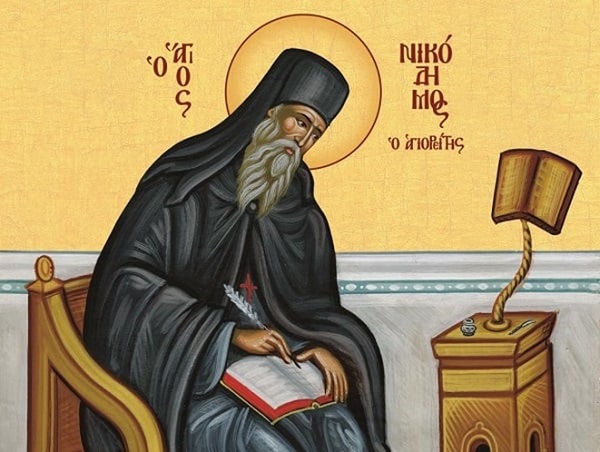Saint Nikodimos the Athonite
17 July 2023On July 14, the Church celebrates the memory of Saint Nikodimos the Athonite. He was an outstanding ecclesiastical personality in the 18th century, who left his mark on both the Church and the Greek nation at a time when the Ottoman empire was at the height of its power. He also contributed to the forestalling of any alteration in Orthodox thinking, which was in danger from the influx of Latin and Protestant ‘missionaries’, whose efforts to proselytize the enslaved Greek, Orthodox population were very determined. Through his multi-faceted struggle, Saint Nikodimos made an enormous contribution to the preservation of Orthodoxy and Hellenism.
He was born on Naxos in 1749 and his baptismal name was Nikolaos (Kallivroutsis). His parents, Antonios and Athanasia, gave him a Christian upbringing and paid for his education from their savings. He initially attended Saint George’s School on Naxos and had Chrysanthos, the brother of Saint Kosmas Aitolos, as a teacher. Thereafter he went to Smyrna for higher studies, at the noted Evangeliki School. His performance there was such that the Metropolitan, Ierotheos, hoped to make him a future principal of the school. He studied theology, philology, philosophy, economics, medicine, astronomy, and even military affairs. He became fluent in French, Italian and Latin and had a vey powerful memory.

In 1770, he returned to Naxos and worked as secretary in the archdiocese. In 1775, he decided to become a monk. He may have been inspired in his decision by his mother, who’d been tonsured a nun on Naxos, with the name of Agathi. He went to the Holy Mountain, to the Monastery of Dionysiou where he was tonsured and given the name Nikodimos. From the outset he lived an exemplary monastic life. The brotherhood of the monastery was impressed by his rare scholarship and calligraphy, so they gave him the obedience of copying out the codices of the monastery. He considered this a great blessing and an opportunity to spend time in the rich library of Dionysiou and other monasteries on the Holy Mountain. He had a passion for the study of the Fathers of the Church and ancient writers. At the same time, he began correspondence with other scholars of the day. In particular, he wrote to Saint Gregory V, later Ecumenical Patriarch and martyr, and also to Saint Athanasios on Paros. He wrote incessantly, day and night, and was the author of a whole host of books, proving himself to be one of the most productive ecclesiastical writers of the 18th century.
As a theologian, he tried to express biblical and patristic teaching and to repel Western influences on the theology and practice of the Church, these having been brought in by the heretical ‘missionaries’. His most important theological work is ‘The Rudder’, 1790, in which, with the assistance of his collaborator, the monk Agapios the Cretan, he managed to collect, codify and interpret all the sacred canons of the Church. This was a real feat, given the means and conditions of that time. The importance of The Rudder can be seen from the fact that, to this day, it remains the best manual of canon and ecclesiastical law in the Church. And his interpretation of the sacred canons is unsurpassed in its authority.
Saint Nikodimos also wrote other books with content beneficial to the soul, and these rival the spiritual texts of the ancient Fathers and ascetics of the Church. Among them were ‘Invisible Warfare’, ‘Spiritual Exercises’ and ‘ A Handbook of Counsels’, as well as others.
Saint Nikodimos is also well-known for his leading role in the movement known as the Kollyvades. This movement began with a group of Athonite monks who initially opposed the practice of holding memorial services on Sundays. According to them, this wasn’t permissible, given that Sunday is a day of joy, dedicated to the Lord’s resurrection, and they proposed Saturdays instead, or other days of the week. An opposing group formed against them, known as the Anti-Kollyvades. These were influenced by the heretical outlook of the West and undertook serious action against the Kollyvades which extended to persecution. Very soon, the Kollyvades movement became a struggle for the renewal of the Church and a return to the true practices of the Early Church.
Among the proposals for renewal were frequent communion for the faithful; insistence on the tradition of the Church and on the spirit of Canon Law; due recognition of the ascetic life; study of the Holy Scriptures; rejection of Latin-based features in the life of the Church; rejection of formalism and, above all, rejection of the secularization of the Church. They also encouraged education as a basic factor in people’s spiritual formation, and thus led a Greek and Orthodox Enlightenment.
It’s worth emphasizing the positive effect which the Kollyvades movement had on modern Hellenism, given that it was a prime contributor to the nation’s spiritual rebirth in the newly-constituted Greek state. Some of the great figures in the ecclesiastical and spiritual life of modern Greece were deeply influenced by the Kollyvades Fathers, among whom were Saint Nikolaos Planas, Papoulakos, Papadiamantis, Moraïtinis and Saint Nektarios. To this day, true monasticism follows the principles of the Kollyvades movement.
Saint Nikodimos fell asleep in the Lord on 14 July, 1809, at the age of sixty, and in 1955 he was canonized. His last words were addressed to his disciples, who were amazed at his serenity in his final moments: ‘I’ve placed Christ within myself, so how can I not be calm?’. His blessed life and very rich literary work make him one of the great saints of the Church.






